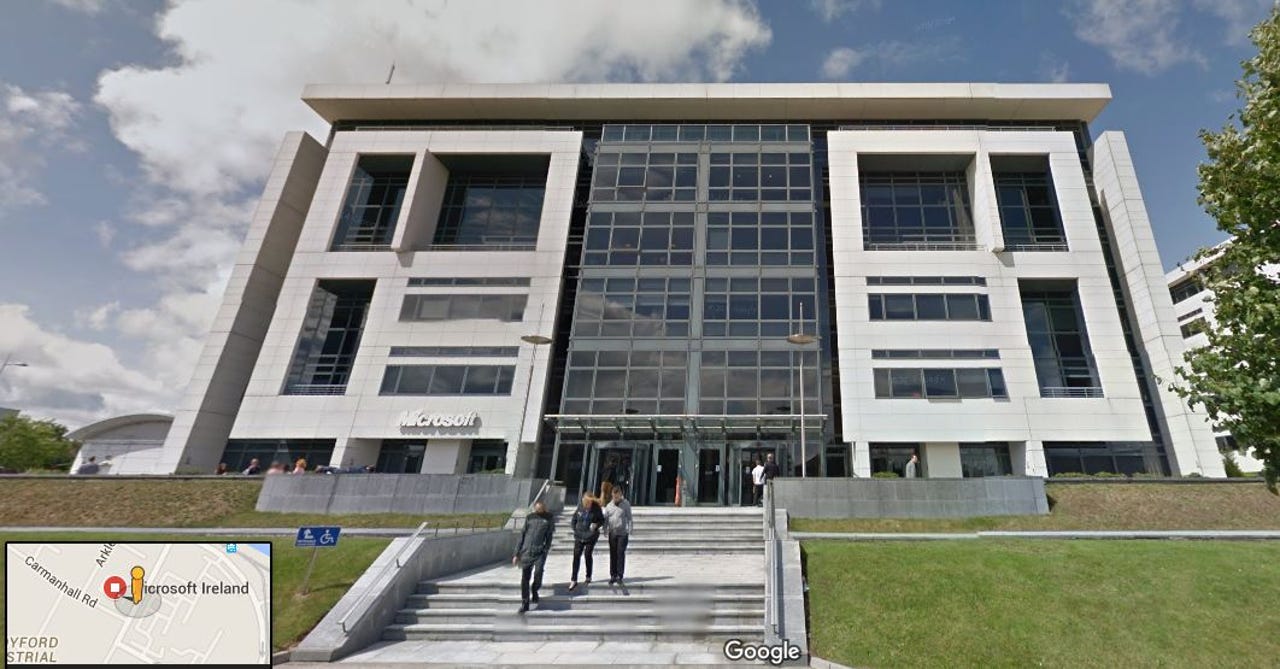Microsoft UK's tax bill challenged... by the Sunday Times

One of several Microsoft Ireland buildings in Dublin....
Microsoft's name has generally been missing from the reporting of tax avoidance by America's tech giants: the brunt of the attack has been borne by Apple, Google, Facebook and Amazon, all of which have sophisticated tax reduction strategies. Now the Sunday Times has thrown Microsoft's hat into the ring, in a half page (paywalled) story headlined "Taxman backs £100m Microsoft wheeze".
The gist of the story is that Microsoft is one of 143 companies who have "advance pricing agreements" with the UK tax collection service, HMRC (Her Majesty's Revenue & Customs). Microsoft's deal runs from 2011 to 2017. The Sunday Times says:
"Under the deal with Microsoft, HMRC agreed the amount the firm could pay its UK subsidiary, Microsoft Ltd, in Reading, Berkshire, for marketing services in 2012. It would also have designated the allocation of profits between Britain and Ireland."
Like a number of companies, Microsoft funnels European revenues through Ireland, where the 12.5 percent corporation tax is lower than the UK's 20 percent rate.
It is, of course, difficult to assess the "local contribution" to corporate profits. Most Microsoft software is created in the USA, while its hardware is designed in the USA and manufactured in China. It looks as though the UK operation is treated partly as a marketing arm, and assessed on the basis that such marketing could be done by a third party.
The Sunday Times story contrasts the UK revenues recorded by Microsoft Ireland Operations with the corporation tax payments recorded in the UK accounts of Microsoft Ltd. In 2014, for example, Microsoft Ltd paid £21.9m ($32m) in corporation tax on revenues of £2.2bn ($3.2bn). However, this doesn't mean much, because taxes are paid on profits, not on revenues. And profits can be managed by multi-nationals, who can set the amount the subsidiary pays the parent company for products and services.
Profits will also be affected by the sums the subsidiary spends on things like research and development, marketing, pension contributions and - via capital allowances - infrastructure such as data centres and other buildings. In the UK, 230 percent of qualified R&D spending can be deducted from trading profits.
As the Sunday Times noted, HMRC said "No company will pay a single penny less in tax because of [advance pricing agreements]", while Microsoft said it "complies with all rules and regulations worldwide". It added that "Our European business, production and distribution is centralised in Ireland and has been since the 1990s." (Microsoft Ireland opened in 1985.)
Nonetheless, American tech companies are coming under increasing pressure to pay more local taxes. The UK has recently introduced a "diverted profits tax" with a 25 percent rate. If it works, this will effectively fine companies who avoid paying the standard 20 percent rate.
Following the revelation that Facebook paid only £4,327 ($6,314) in UK corporation tax in 2014 - less than its staff paid in income tax - the company said it would change its charging system and pay more tax from 2017.
Earlier this year, Google agreed to pay the UK an extra £130m ($181m) in back taxes, covering the previous decade. However, France wants €1.6bn ($1.8bn) in back taxes. Last month, French police raided Google's Paris headquarters, saying Google was "now under investigation for aggravated financial fraud and organised money laundering".
The European Union is also investigating low tax arrangements made by Apple, Amazon and Starbucks with Ireland, Luxembourg and the Netherlands respectively. (Apple Ireland reportedly pays less than 2 percent.)
The stakes are high. The EU reckons that corporate tax avoidance is costing member states between €50 billion and €70 billion a year.
The US has a similar problem. Tech giants such as Apple, Microsoft and Google are holding billions of dollars in profits overseas rather than pay the US government's 35 percent tax rate. Around $2 trillion is now "trapped" overseas. And as American Prospect observes: "$700 billion is a lot of [tax] revenue, even in Washington."
